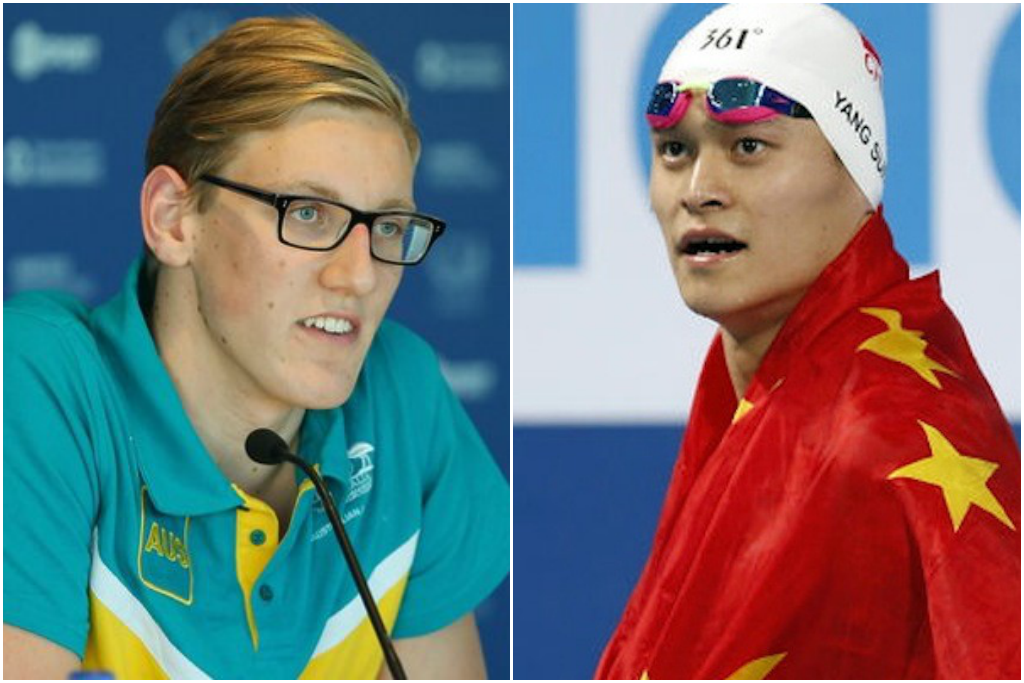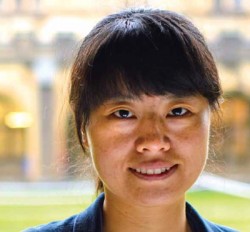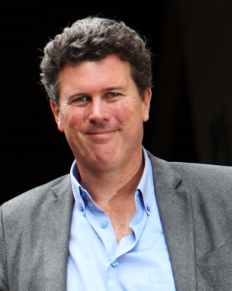Could The Mack Horton Olympics Controversy Actually Impact Australia’s Relationship With China?
We asked a whole bunch of foreign policy experts.

The Olympics is supposed to be about bringing people together, but recent drama between Aussie swimmer Mack Horton and his Chinese rival Sun Yang is getting so intense it’s giving off major Drake vs Meek Mill vibes. Last Sunday Horton sledged Yang by labelling him a “drug cheat”, sparking outrage from Chinese fans, demands for an apology from China’s swimming team and an aggressive editorial by Chinese state-run media.
So why is everyone so tense? Yang served a three month suspension back in 2014 after he tested positive for a banned substance, which was the incident behind Horton’s “drug cheat” sledge. Horton’s also accused Yang of deliberately splashing him in the pool, in an attempt to break his concentration. It was all a bit of harmless banter to start but things got serious when Horton edged out Yang to take gold in the 400m freestyle final.
Chinese fans went ballistic on social media, flooding Horton’s Facebook page with Taylor Swift-esque snake emojis and dropping meme after meme on Twitter. Chinese state-run newspaper Global Times also got fired up, describing Australia as “a country at the fringes of civilisation”. The paper also wrote, “If Horton won the competition by disrupting his rival in an immoral way, his win is disgraceful, and not in line with the spirit of the Olympics.”
#SunYang
看到傻逼的留言大家记得点报告,让他们从这个话题下面滚蛋
把无知当真性情的模样真是和@_mackhorton 一模一样#apologizetosunyang pic.twitter.com/pbiVbBzTVz— Daisy (@Yunshansan) August 9, 2016
#apologizetosunyang 道歉? pic.twitter.com/8b6GacXyFO
— 楊祎洁 (@yang2yujie) August 9, 2016
Given the dramatic escalation in tensions on social media and in Chinese state-run newspapers we wondered whether the swimming dispute could actually turn into a full-on diplomatic crisis. So we decided to ask some experts on Australia-China relations for their thoughts.
–
 Dr Malcolm Davis, Senior Analyst at The Australian Strategic Policy Institute
Dr Malcolm Davis, Senior Analyst at The Australian Strategic Policy Institute
“Firstly, the Chinese commentary is coming out of the Global Times which is a tabloid rather than a broadsheet,” Dr Davis told Junkee. “It is affiliated with the Chinese Communist Party (CCP), but its role might best be described as ‘muck raking’ rather than serious journalism. Commentary in that publication is not taken as being necessarily the official line from Beijing. Having said that, the CCP does oversee it, so any commentary coming out of the Global Times would have to go through that filter, and be approved.”
So according to Dr Davis, we shouldn’t take the Global Times super seriously, since it’s sort of like the Chinese version of The Daily Telegraph. But at the end of the day it’s still an outlet controlled by the Chinese Communist Party. He does think that there are some links between this latest editorial and ongoing tensions in the South China Sea.
“This development is in line with other developments regarding Australia’s policy towards the South China Sea, with the Global Times publishing threatening editorials recently on Australia’s stance. So the Global Times can act as a nationalist propaganda arm for China, whilst giving more formal media outlets and the CCP a measure of plausible deniability,” he said.
Could the Horton-Yang issue actually lead to ongoing tension between China and Australia? “In terms of how this will impact Australia-China relations – the short answer is ‘not much’,” Dr Davis said. “There are much more serious and important issues to focus on, such as the South China Sea and Chinese efforts to invest in critical infrastructure, such as the NSW Power Grid Having said that, this issue will be used by the Chinese to whip up nationalism at home to strengthen popular support for the CCP.”
So how should Australia respond? “I don’t think Australian government intervention would be wise. It would appear to be ‘kowtowing’ to Beijing which would establish a precedent that the Chinese government could see as justification to push us in other areas – such as investment in key Australian critical infrastructure,” Dr Davis said.
–
 Dr Minglu Chen, Lecturer at the China Studies Centre, University of Sydney
Dr Minglu Chen, Lecturer at the China Studies Centre, University of Sydney
“At the state-to-state level there won’t be an impact on Australia’s relationship with China, but in terms of people-to-people relationships there could be an impact,” Dr Chen said. “There are a series of instances that are contributing to the current controversy.”
“Last week Channel Seven did a report where they predicted the medal tally at the Rio Olympics, but instead of showing the Chinese national flag they showed the Chilean national flag. That was noted by the Chinese community and there’s been a lot of discussion on Chinese social media websites like WeChat.
“When Channel Seven broadcast the opening ceremony they cut to an ad when Chinese athletes began marching. All these issues combined don’t contribute to a prosperous relationship at a grassroots level,” Dr Chen said.
The issue of Channel Seven’s broadcasting hiccups has also been picked up by the construction union in Australia. A media release issued by the union’s NSW division has called on the network to apologise to the Chinese community for failing to show the correct flag and cutting to an ad break when the Chinese team entered the stadium for the opening ceremony.
Dr Chen doesn’t think we need to pay too much attention to the Global Times. “The Global Times is known for being more aggressive than other state-owned media. I wouldn’t read too much into it. It’s always been quite hawkish. Global Times tends to only represent the more aggressive political view in China,” she said.
There’s a lot of history to the current Olympics tension between the two countries, according to Dr Chen. “One of the ways the Communist Party builds popular support is by portraying itself as the party that ended China’s ‘century of humiliation’. Sport is a very important part of modern state sanctioned nationalism. It’s all about China standing up and not being defeated by the foreigners. Nationalism runs really high in China. The Olympics is one of the main channels where these emotions are expressed.
“Australia hasn’t been popular amongst the Chinese public recently, starting with Julie Bishop’s comments on the South China Sea and now with Mack Horton’s comments. Sun Yang is regarded as a national hero.”
Dr Chen thinks many people in China won’t see a distinction between Mack Horton’s views, Channel Seven’s technical errors and the official policy of the Australian government. “Because of the way things are run in China, any kind of TV channel people see they understand it represents the state. For a lot of members of the Chinese community who don’t know the Australian system, they just take it as as the government position – representing a shared feeling.”
–
 Prof Benjamin Reilly, Dean at the Sir Walter Murdoch School of Public Policy and International Affairs
Prof Benjamin Reilly, Dean at the Sir Walter Murdoch School of Public Policy and International Affairs
“If it [the Global Times article] was just about the Olympics doping issue then we’d ignore it. But the fact that it’s come hot on the heels after earlier aggressive and inflammatory commentary on the South China Sea issue, makes it a bit more relevant for our foreign policy and international affairs relationship with China,” Professor Reilly said.
“You have to see a connection between the two. They both had the same kind of derogatory language about us being a nation of prisoners. I do think it’s unlikely we would have had that [the latest editorial] if the Global Times hadn’t already decided to go in hard.
“I don’t think there will be any formal response from Australia. The truth is, this is a sign of weakness from China. This really over the top aggressive, gratuitously offensive sort of statement… I assume they think its some sort of show of strength, but it’s really showing their underlying weakness.”
–
 Ryan Manuel, ANU College of Asia and the Pacific
Ryan Manuel, ANU College of Asia and the Pacific
“The Sun Yang controversy won’t have a huge impact on Australia-China relations. Following the 1500m final, I can’t see it extended much further,” Manuel told Junkee.
“Media, even in China, exists to sell papers and monetise eyeballs. Nationalism does both. In the Horton case in particular, it seems much more driven by media reading social media andpublic opinion, assessing that readers and viewers would want some nationalistic red meat, and giving the punters what they wanted.
“The South China Sea is a much bigger issue affecting Australia’s image. Chinese media is currently very keen on pursuing a line that Australia is very close to the US and the Horton incident may be seen as useful fodder for that line. But Australia has been very outspoken and ahead of other countries on the South China Sea for a number of years now, and so impacts on the relationship, should there be any, will come over years and decades rather than minutes or days.
“In the short-term, social media companies will do well. And there may be some impact on Chinese sport tourism — Sun Yang was coached here and trained here for a number of years, I believe. But this issue will blow over very soon.”
–
So what’s the expert consensus? The Horton-Yang controversy in isolation is unlikely to have any ongoing impacts, but the comments from the Global Times need to be viewed in the wider context of ongoing tension between China and Australia over the South China Sea and Chinese investment in Australia. There’s also a chance that relationships could be damaged at a grassroots level, with members of the Chinese community interpreting Australian hostility during the Olympics as part of a broader, national sentiment.
It’s probably a good time for everyone to take a few deep breaths and relax. The Olympics are supposed to be a bit of harmless fun, not jingoistic chest-beating that feeds into rising geopolitical tensions and border disputes. So please, let’s all chill out and enjoy some sport.



